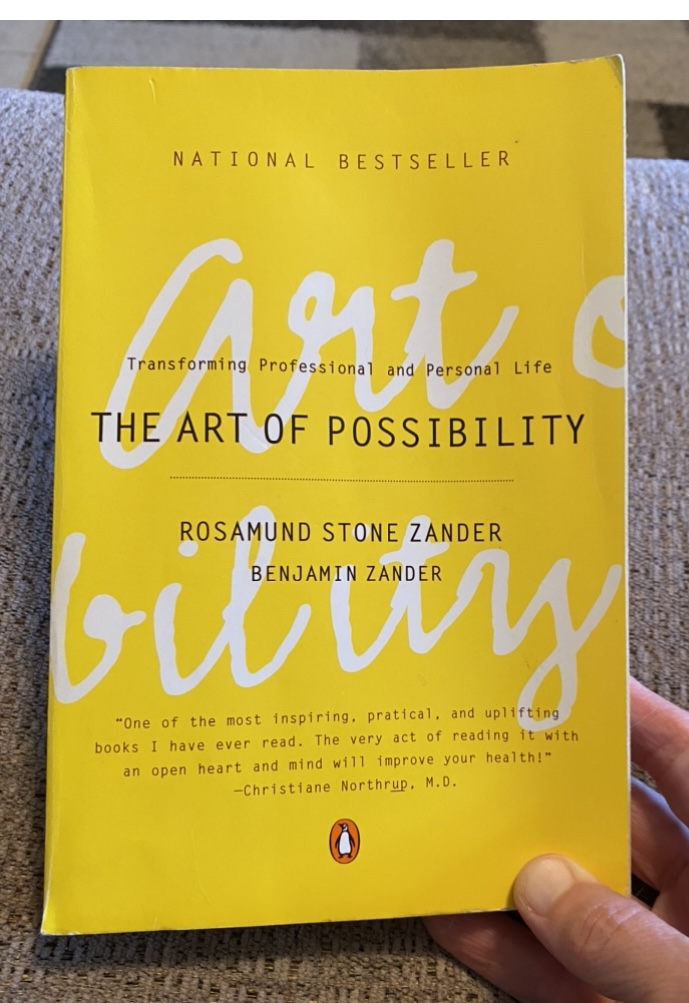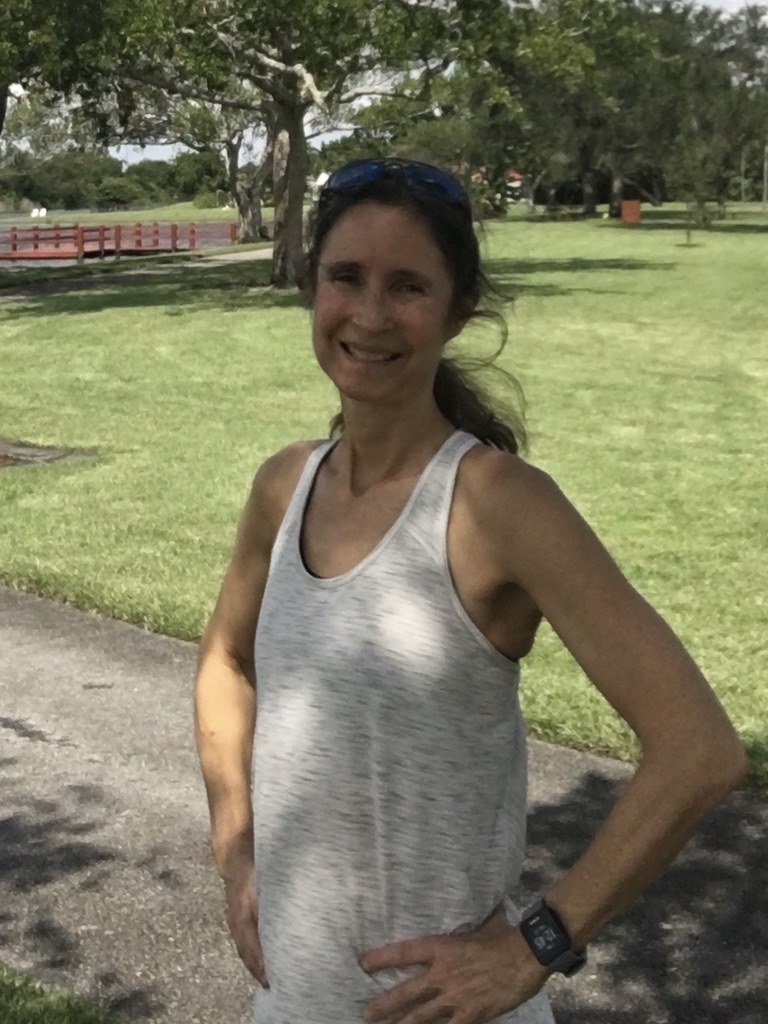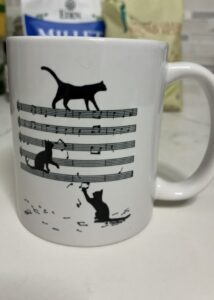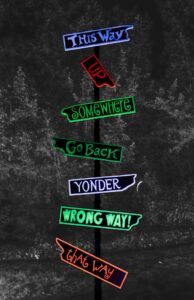Years ago I read a great book called The Art of Possibility by Rosamund Stone Zander and Benjamin Zander. In a chapter titled “It’s All Invented” we learn that each species perceives information from our surroundings differently. Frogs don’t see any colors, while bees can see patterns in ultraviolet light on flowers. Owls can see in the dark, and dogs hear sounds that we can’t hear.
We think we can see and hear everything, but in fact our senses only bring us selective information. Our brains use this information to tell us a story of what we “know” about the universe.
If our knowledge about what we’re seeing and hearing is invented by our brains, what other stories are we inventing? “I’m not good at math.” “My coworker is badmouthing me behind my back.” “I’m a slow runner.” These are all stories we tell ourselves, all the time.
In the book they show a famous puzzle of the nine dots. The goal is to join all nine dots with four straight lines, without lifting your pen from the paper:

Nearly everyone classifies the dots into a square:

and by doing it this way, the puzzle is unsolvable. But nowhere in the instructions did it say “connect the dots with four straight lines, without lifting your pen from the paper… within the square formed by the outer dots.” What happens when you realize you can use the whole sheet of paper?

The false limitation of the square is an invention by our minds. It’s a perfect reminder that it’s all invented- everything is just a story we tell ourselves. The chapter ends with this food for thought:
What assumption am I making,
That I’m not aware I’m making,
That gives me what I see?
And then…
What might I now invent,
That I haven’t yet invented,
That would give me other choices?
Since it’s Tuesday I’m linking up with Kim and Zenaida for their Tuesday Topics. Thanks ladies!






20 Responses
Interesting food for thought! Funny, I initially would have solved the puzzle in a different way. I believe some of the stories we tell ourselves to protect us from hurt or disappointment. Other stories, might limit us. Interesting stuff for a former psychoanalyst 🙂
Hmmm! I’m now wondering how you would try to solve the puzzle (maybe I’m a secret psychoanalyst myself!)
I remember doing this puzzle in high school and also in college and I think I approached it different ways both times, lol
Ha, I wonder what that says about you at those two different phases in your life!
We all have limiting beliefs — and that’s the exact newsletter (and practice) I happen to be working on right before I opened your blog, Jenny. Nice synchronicity. The really cool things is we can change them — but it takes work. And the longer we’ve been believing in them, the more we usually have to work on it.
Food for thought indeed! Sound like a really interesting book — thanks for sharing it!
Oh, that’s a funny coincidence. But I guess not really- like you said, we all have limiting beliefs so it’s something we should be thinking about and working on. Easier said than done- I know.
Geez, Jenny, I wasn’t prepared to think so deeply! Sounds like an interesting book. I’ll have to check it out.
Ha ha, yes I guess you weren’t expecting a logic puzzle today!
That puzzle is so cool! I didn’t think of going outside the lines. I AM LIMITING MYSELF! LOL.
I wonder how many people actually think of going outside the lines… I’ll bet not many.
I’ve seen this puzzle before and love the brilliant simplicity…that stumps almost everyone when they see it (including me)!!!
I’ve been thinking a lot about the stories I tell myself lately; changing the narrative can totally and completely change the outcome and perception of a situation. Just sometimes I get locked into a story and classify it as Fact when it’s really just my interpretation of events.
Great food for thought, Jenny!
Yes, we definitely have to remember that the things we’re telling ourselves are just stories, one way (of many) of looking at a situation. Easier said than done- I have to remind myself of this all the time.
What an interesting thought.
I do remember doing this puzzle.
It ties into the fact that we are think differently and that we may all be capable of more than we think. Because “thinking” influences what we do.
In fact about this past weekend with 9 other friends. I heard someone say (when I said I was going for a walk) about how active I was. At the same time I was thinking how inactive I was during this trip. If I was alone, I would have done a hike instead of returning home to rest.
Wait! Didn’t you run a half marathon on this trip? That sounds active to me. I guess it all depends on your perspective.
Yes on Sunday but I was ready to walk or hike, Sat, Mon and Tues…. they though I was crazy….
I used to work in an office with a bunch of counselors and one of them had this puzzle box. I frequently had to be in her office for meetings and the like and I would always mess with the puzzle box and I usually figured it out, but I always started with the exact same strategy and that strategy had proven to not work over and over again! I definitely know that once I get started doing something in some way, I get stuck on that way and it’s hard to change gears. It’s something I try to work on, but it’s worth a reminder!
That puzzle kind of reminds me of a word puzzle about a father and son being in an accident and how the parent operates on the child – but how is that possible if dad was injured too, but it turns out the parent operating is mom. But sadly, that isn’t an obvious answer for people reading the puzzle because we aren’t conditioned to think of women being doctors. I am surely butchering this riddle, but it has the same issue at heart – we make assumptions that limit solutions.
I have tried to work on negative self talk over the last several years because it is something I have really struggled with for many years. Because if you tell yourself a story over and over again, it’s hard to overcome that assumption you are making about yourself/your abilities/how others perceive you. But I have found that as I get older, I am far kinder to myself so that is good!
I think it actually gets easier as we get older! At least that’s what I’ve found.
You didn’t butcher the riddle- I got it! I think I’ve heard it before, and yes- it’s all about limiting beliefs.
Oh, a concept I talk so often about with my husband… everything is perception! Not only what we can experience with our senses, but also what our mind makes of that (limited) information. Quite fascinating, eh?
Yes, it is! Everything really is perception.